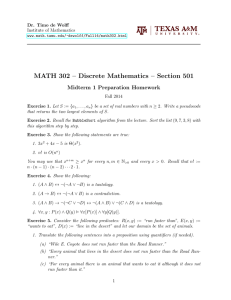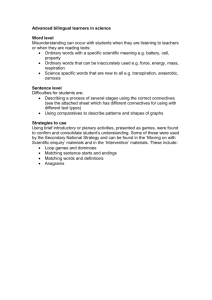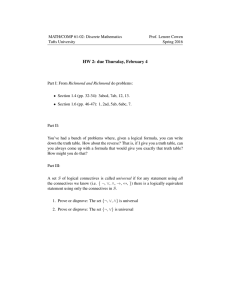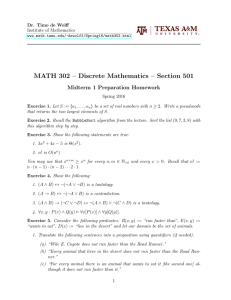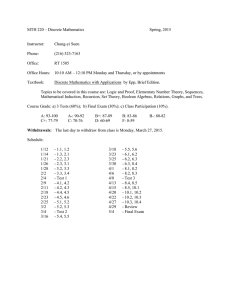Discrete Mathematics Lecture 2 9/3/2015 1
advertisement
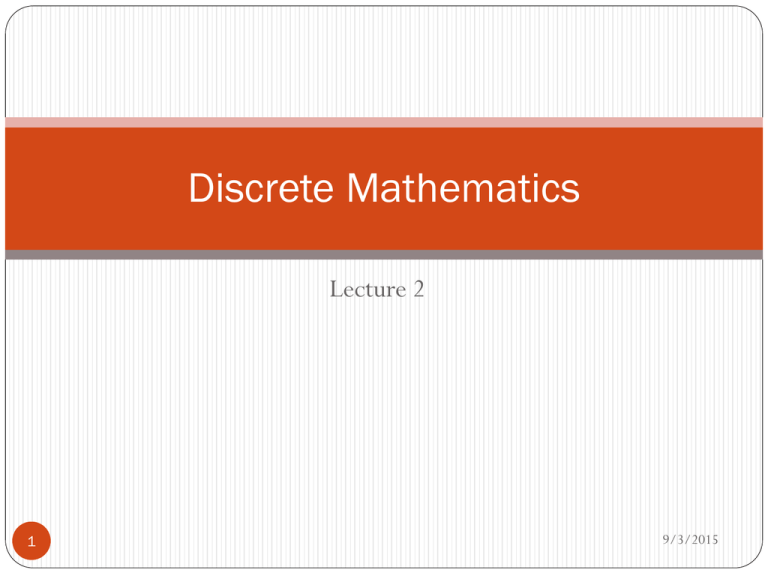
Discrete Mathematics Lecture 2 1 9/3/2015 Introduction What is Discrete Mathematics? Discrete Mathematics 2 concerns processes that consist of a sequence of individual steps. LOGIC: Logic is the study of the principles and methods that distinguish between a valid and an invalid argument. SIMPLE STATEMENT: A statement is a declarative sentence that is either true or false but not both. A statement is also referred to as a proposition 9/3/2015 1 Logic Concepts The logic imitate our intuitions feelings by setting down explaining ideas that behave analogously The logic furnishes statements that describe the surrounding world that can be true/false. Used in numerous applications: circuit design, programs, verification of correctness of programs, artificial intelligence, etc. 3 9/3/2015 Propositional Logic • Is a declarative statement that is either true or false, but not both. It is not an Opinion, a Command, or a Question. Such as: – Washington, D.C., is the capital of USA – California is adjacent to New York – 1+1=2 – 2+2=5 • Not declarative –What time is it? Question – Read this carefully Command It is a nice day opinion 4 9/3/2015 Propositional Logic • Elementary/Simple statement is atomic, with a verb, subject and object but no connectives (NOT, OR, AND, If…Then, Iff) • Construct correct mathematical arguments. • Give precise meaning to mathematical statements • Focuses on the relationships among statements. • Rules are used to distinguish between valid (True) and invalid (False) arguments/statement. Hence logic assures us for any combination/connection of these statements as being True/False. 5 9/3/2015 Examples Propositions 1) Grass is green. 2) 4 + 2 = 6 3) 4 + 2 = 7 Not Propositions 1) Close the door. 2) x is greater than 2. 3) He is very rich 4) There are four fingers in a hand. 6 9/3/2015 Examples Rule: If the sentence is preceded by other sentences that make the pronoun or variable reference clear, then the sentence is a statement. 7 9/3/2015 UNDERSTANDING STATEMENTS 1) x + 2 is positive. 2) May I come in? 3) Logic is interesting. 4) It is hot today. 5) -1 > 0 6) x + y = 12 8 Not a statement Not a statement A statement A statement A statement Not a statement 9/3/2015 False, True, Statements Axiom : False is the opposite to Truth. A statement/declaration/declarative-statement is a description of something (sentence), which Is Not an Opinion, a Command, or Question. A statement Is A Sentence That Is Either True Or False, but not both simultaneously. 9 9/3/2015 Examples Examples of statements: – I’m 35 years old. – I have 100 children. – I always tell the truth. – I’m lying to you. Q’s: Which statements are: True? False? Both? Neither? 10 9/3/2015 EXAMPLES: a. 2+2 = 4, b. It is Sunday today If a proposition is true, we say that it has a truth value of "true”. If a proposition is false, its truth value is "false". The truth values “true” and “false” are, respectively, denoted by the letters T and F. 11 9/3/2015 Logical connectives EXAMPLES: 1. “3 + 2 = 5” and “Makka is a city in KSA” 2. “The grass is green” or “ It is hot today” 3. “Discrete Mathematics is not difficult to me” . AND, OR, NOT are called LOGICAL CONNECTIVES. SYMBOLIC REPRESENTATION Statements are symbolically represented by letters such as p, q, r,... EXAMPLES: p = “Riyadh is the capital of KSA” q = “17 is divisible by 3” 12 9/3/2015 Symbolic logic In symbolic logic, we use lower case letters such as p, q, r, 13 and s to represent statements. Here are two examples: p: Riyadh is the capital of KSA. q: Abin Al-Haythim is one of the greatest muslim scientists. Hence: The letter p represents the 1st statement. The letter q represents the 2nd statement. 9/3/2015 Logical operators /connevtives • If you're wealthy or well educated, then you'll be happy. We can break this statement down into three basic sentences: You're wealthy,You're well educated,You'll be happy. These sentences are called simple statements because each one conveys/takes/sends/carries/transfers/delivers one idea with no connecting words. Statements formed by combining two or more simple statements are called compound statements. Logical connectives are used to join simple statements to form a compound statement. These Connectives include the words AND, OR, IF . . . THEN, and IF AND ONLY IF. 14 9/3/2015 Compound statements Compound statements appear throughout written and spoken language. We need to be able to understand the logic of such statements to analyze information objectively. we will concentrate our analysis on four kinds of compound statements. 15 9/3/2015 TABLE 16 CONNECTIVE MEANING SYMBOLE CALLED Negation Not ¬ Tilde Conjunction And ∧ Hat Disjunction Or ∨ Vel Conditional If …..then …. → Arrow Biconditional If and only if ↔ Double arrow 9/3/2015 Exercise sets determine whether or not each sentence is a 17 Statement. Specify which is True and which is False. 1. George W. Bush was the Democratic candidate for president in 2004. 2. John Kerry was the Republican candidate for president in 2004. 3. Take the most interesting classes you can find. 4. Don't try to study on a Friday night in the dorms. 5. The average human brain contains 100 billion neurons. 9/3/2015 Exercise 6. There are 2.500.000 rivets in the Eiffel Tower. 7. Is the unexamined life worth living? 8. Is this the best of all possible worlds? 9. Some Catholic countries have legalized same-sex marriage. l0. Some U.S. presidents were assassinated. 11. 9 + 6 = 16 12 . 9 x 6 = 64 18 9/3/2015
